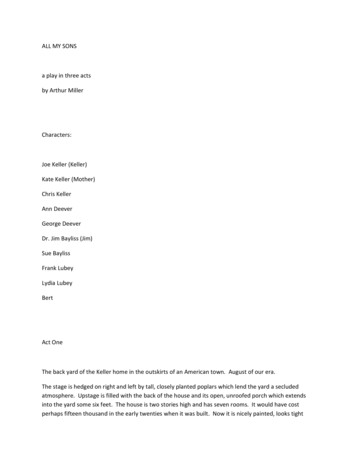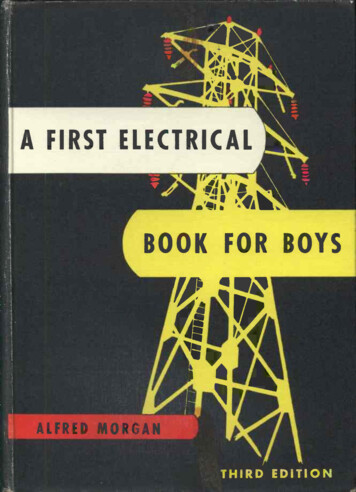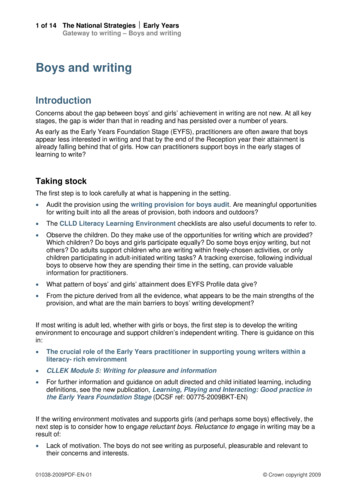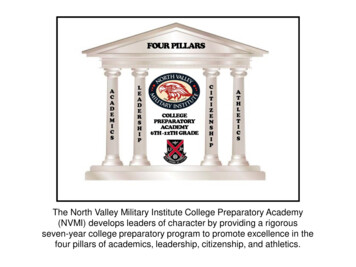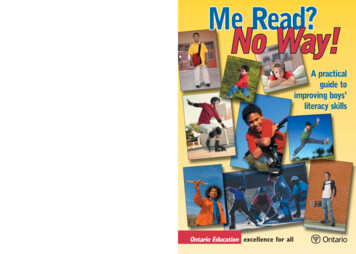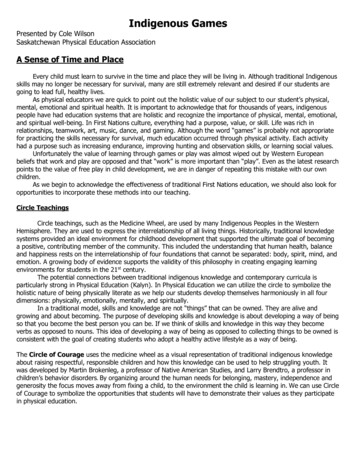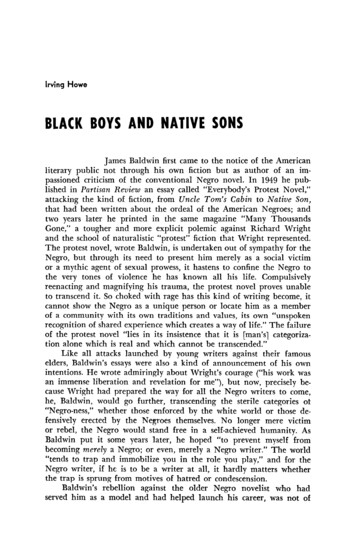
Transcription
Irving HoweBLACK BOYS AND NATIVE SONSJames Baldwin first came to the notice of the Americanliterary public not through his own fiction but as author of an impassioned criticism of the conventional Negro novel. In 1949 he published in Partisan Review an essay called "Everybody's Protest Novel,"attacking the kind of fiction, from Uncle Tom's Cabin to Native Son,that had been written about the ordeal of the American Negroes; andtwo years later he printed in the same magazine "Many ThousandsGone," a tougher and more explicit polemic against Richard Wrightand the school of naturalistic "protest" fiction that Wright represented.The protest novel, wrote Baldwin, is undertaken out of sympathy for theNegro, but through its need to present him merely as a social victimor a mythic agent of sexual prowess, it hastens to confine the Negro tothe very tones of violence he has known all his life. Compulsivelyreenacting and magnifying his trauma, the protest novel proves unableto transcend it. So choked with rage has this kind of writing become, itcannot show the Negro as a unique person or locate him as a memberof a community with its own traditions and values, its own "unspokenrecognition of shared experience which creates a way of life." The failureof the protest novel "lies in its insistence that it is {man'sl categorization alone which is real and which cannot be transcended."Like all attacks launched by young writers against their famouselders, Baldwin's essays were also a kind of announcement of his ownintentions. He wrote admiringly about Wright's courage ("his work wasan immense liberation and revelation for me"), but now, precisely because Wright had prepared the way for all the Negro writers to come,he, Baldwin, would go further, transcending the sterile categories of"Negro-ness," whether those enforced by the white world or those defensively erected by the Negroes themselves. No longer mere victimor rebel, the Negro would stand free in a self-achieved humanity. AsBaldwin put it some years later, he hoped "to prevent myself frombecoming merely a Negro; or even, merely a Negro writer." The world"tends to trap and immobilize you in the role you play," and for theNegro writer, if he is to be a writer at all, it hardly matters whetherthe trap is sprung from motives of hatred or condescension.Baldwin's rebellion against the older Negro novelist who hadserved him as a model and had helped launch his career, was not of
354course an unprecedented event. The history of literature is full ofsuch painful ruptures, and the issue Baldwin raised is one that keepsrecurring, usually as an aftermath to a period of "socially engaged"writing. The novel is an inherently ambiguous genre: it strains towardformal autonomy and can seldom avoid being a public gesture. If it istrue, as Baldwin said in "Everybody's Protest Novel," that "literatureand sociology are not one and the same," it is equally true that suchstatements hardly begin to cope with the problem of how a writer'sown experience affects his desire to represent human affairs in a workof fiction. Baldwin's formula evades, through rhetorical sweep, thegenuinely difficult issue of the relationship between social experienceand literature.Yet in Notes of a Native Son, the book in which his remark appears, Baldwin could also say: "One writes out of one thing only—one's own experience." What, then, was the experience of a man with ablack skin, what could it be in this country? How could a Negro putpen to paper, how could he so much as think or breathe, without someimpulsion to protest, be it harsh or mild, political or private, releasedor buried? The "sociology" of his existence formed a constant pressureon his literary work, and not merely in the way this might be truefor any writer, but with a pain and ferocity that nothing could remove.James Baldwin's early essays are superbly eloquent, displayingvirtually in full the gifts that would enable him to become one of thegreat American rhetoricians. But these essays, like some of the laterones, are marred by rifts in logic, so little noticed when one gets sweptaway by the brilliance of the language that it takes a special effort toattend their argument.Later Baldwin would see the problems of the Negro writer with agreater charity and more mature doubt. Reviewing in 1959 a book ofpoems by Langston Hughes, he wrote: "Hughes is an American Negropoet and has no choice but to be acutely aware of it. He is not the firstAmerican Negro to find the war between his social and artistic responsibilities all but irreconcilable." All but irreconcilable: the phrasestrikes a note sharply different from Baldwin's attack upon Wright inthe early fifties. And it is not hard to surmise the reasons for thischange. In the intervening years Baldwin had been living through someof the experiences that had goaded Richard Wright into rage and drivenhim into exile; he too, like Wright, had been to hell and back, manytimes over.Gawd, A h wish all themwhite folks was dead.The day Native Son appeared, American culture was changed forever. No matter how much qualifying the book might later need, itmade impossible a repetition of the old lies. In all its crudeness, melodrama and claustrophobia of vision, Richard Wright's novel brought
355out into the open, as no one ever had before, the hatred, fear andviolence that have crippled and may yet destroy our culture.A blow at the white man, the novel forced him to recognize himself as an oppressor. A blow at the black man, the novel forced himto recognize the cost of his submission. Native Son assaulted the mostcherished of American vanities: the hope that the accumulated injusticeof the past would bring with it no lasting penalties, the fantasy thatin his humiliation the Negro somehow retained a sexual potency—orwas it a childlike good-nature?—that made it necessary to envy andstill more to suppress him. Speaking from the black wrath of retribution, Wright insisted that history can be a punishment. He told us theone thing even the most liberal whites preferred not to hear: thatNegroes were far from patient or forgiving, that they were scarred byfear, that they hated every moment of their suppression even whenseeming most acquiescent, and that often enough they hated us, thedecent and cultivated white men who from complicity or neglect sharedin the responsibility for their plight. If such younger novelists as Baldwin and Ralph Ellison were to move beyond Wright's harsh naturalismand toward more supple modes of fiction, that was possible only becauseWright had been there first, courageous enough to release the full weightof his anger.In Black Boy, the autobiographical narrative he published severalyears later, Wright would tell of an experience he had while workingas a bellboy in the South. Many times he had come into a hotel roomcarrying luggage or food and seen naked white women lounging about,unmoved by shame at his presence, for "blacks were not consideredhuman being anyway. .I was a non-man. I felt doubly cast out." Withthe publication of Native Son, however, Wright forced his readers toacknowledge his anger, and in that way, if none other, he wrested forhimself a sense of dignity as a man. He forced his readers to confrontthe disease of our culture, and to one of its most terrifying symptomshe gave the name of Bigger Thomas.Brutal and brutalized, lost forever to his unexpended hatred andhis fear of the world, a numbed and illiterate black boy stumbling intoa murder and never, not even at the edge of the electric chair, breakingthrough to an understanding of either his plight or himself, BiggerThomas was a part of Richard Wright, a part even of the James Baldwin who stared with horror at Wright's Bigger, unable either to absorbhim into his consciousness or eject him from it. Enormous courage, adiscipline of self-conquest, was required to conceive Bigger Thomas, forthis was no eloquent Negro spokesman, no admirable intellectual orformidable proletarian. Bigger was drawn—one would surmise, deliberately—from white fantasy and white contempt. Bigger was the worstof Negro life accepted, then rendered a trifle conscious and thrown backat those who had made him what he was. "No American Negro exists,"Baldwin would later write, "who does not have his private BiggerThomas living in the skull."
356Wright drove his narrative to the very core of American phobia:sexual fright, sexual violation. He understood that the fantasy of rapeis a consequence of guilt, what the whites suppose themselves to deserve.He understood that the white man's notion of uncontaminated Negrovitality, little as it had to do with the bitter realities of Negro life,reflected some ill-formed and buried feeling that our culture has rundown, lost its blood, become febrile. And he grasped the way in whichthe sexual issue has been intertwined with social relationships, for evenas the white people who hire Bigger as their chauffeur are decent andcharitable, even as the girl he accidentally kills is a liberal of sorts,theirs is the power and the privilege. "We black and they white. Theygot things and we ain't. They do things and we can't."The novel barely stops to provision a recognizable social world,often contenting itself with cartoon simplicities and yielding almostentirely to the nightmare incomprehension of Bigger Thomas. The moodis apocalyptic, the tone superbly aggressive. Wright was an existentialistlong before he heard the name, for he was committed to the literatureof extreme situations both through the pressures of his rage and thegasping hope of an ultimate catharsis.Wright confronts both the violence and the crippling limitationsof Bigger Thomas. For Bigger white people are not people at all, butsomething more, "a sort of great natural force, like a stormy sky looming overhead." And only through violence does he gather a little meaning in life, pitifully little: "he had murdered and created a new lifefor himself." Beyond that Bigger cannot go.At first Native Son seems still another naturalistic novel: a novelof exposure and accumulation, charting the waste of the undersides ofthe American city. Behind the book one senses the molding influenceof Theodore Dreiser, especially the Dreiser of A n A merican Tragedywho knows there are situations so oppressive that only violence canprovide their victims with the hope of dignity. Like Dreiser, Wrightwished to pummel his readers into awareness; like Dreiser, to overpower them with the sense of society as an enclosing force. Yet thecomparison is finally of limited value, and for the disconcerting reasonthat Dreiser had a white skin and Wright a black one.The usual naturalistic novel is written with detachment, as if bya scientist surveying a field of operations; it is a novel in which thewriter withdraws from a detested world and coldly piles up the evidencefor detesting it. Native Son, though preserving some of the devices ofthe naturalistic novel, deviates sharply from its characteristic tone: atone Wright could not possibly have maintained and which, it may be,no Negro novelist can really hold for long. Native Son is a work ofassault rather than withdrawal; the author yields himself in part to avision of nightmare. Bigger's cowering perception of the world becomesthe most vivid and authentic component of the book. Naturalismpushed to an extreme turns here into something other than itself, a kind
357of expressionist outburst, no longer a replica of the familiar socialworld but a self-contained realm of grotesque emblems.That Native Son has grave faults anyone can see. The languageis often coarse, flat in rhythm, syntactically overburdened, heavy withjournalistic slag. Apart from Bigger, who seems more a brute energythan a particularized figure, the characters have little reality, theNegroes being mere stock accessories and the whites either "agit-prop"villains or heroic Communists whom Wright finds it easier to admirefrom a distance than establish from within. The long speech by Bigger's radical lawyer Max (again a device apparently borrowed fromDreiser) is ill-related to the book itself: Wright had not achievedDreiser's capacity for absorbing everything, even the most recalcitrantphilosophical passages, into a unified vision of things. Between Wright'sfeelings as a Negro and his beliefs as a Communist there is hardly agenuine fusion, and it is through this gap that a good part of thenovel's unreality pours in.Yet it should be said that the endlessly repeated criticism thatWright caps his melodrama with a party-line oration tends to oversimplify the novel, for Wright is too honest simply to allow the propagandistic message to constitute the last word. Indeed, the last word isgiven not to Max but to Bigger. For at the end Bigger remains at themercy of his hatred and fear, the lawyer retreats helplessly, the projectedunion between political consciousness and raw revolt has not beenachieved—as if Wright were persuaded that, all ideology apart, thereis for each Negro an ultimate trial that he can bear only by himself.Black Boy, which appeared five years after Native Son, is a slighterbut more skillful piece of writing. Richard Wright came from abroken home, and as he moved from his helpless mother to a grandmother whose religious fanaticism (she was a Seventh-Day Adventist)proved utterly suffocating, he soon picked up a precocious knowledgeof vice and a realistic awareness of social power. This autobiographicalmemoir, a small classic in the literature of self-discovery, is packed withharsh evocations of Negro adolescence in the South. The young Wrightlearns how wounding it is to wear the mask of a grinning niggerboyin order to keep a job. He examines the life of the Negroes and judgesit without charity or idyllic compensations—for he already knows, inhis heart and bones, that to be oppressed means to lose out on humanpossibilities. By the time he is seventeen, preparing to leave for Chicago,where he will work on a WPA project, become a member of the Communist party, and publish his first book of stories called Uncle Tom'sChildren, Wright has managed to achieve the beginnings of consciousness, through a slow and painful growth from the very bottom of deprivation to the threshold of artistic achievement and a glimpsed ideaof freedom.IIIBaldwin's attack upon Wright had partly been anticipated by the
358more sophisticated American critics. Alfred Kazin, for example, hadfound in Wright a troubling obsession with violence:If he chose to write the story of Bigger Thomas as a grotesque crimestory, it is because his own indignation and the sickness of the age combined to make him dependent on violence and shock, to astonish thereader by torrential scenes of cruelty, hunger, rape, murder and flight,and then enlighten him by crude Stalinist homilies.The last phrase apart, something quite similar could be said aboutthe author of Crime and Punishment; it is disconcerting to reflect thatfew novelists, even the very greatest, could pass this kind of moralinspection. For the novel as a genre seems to have an inherent bias toward extreme effects, such as violence, cruelty and the like. More important, Kazin's judgment rests on the assumption that a critic canreadily distinguish between the genuine need of a writer to cope withugly realities and the damaging effect these realities may have uponhis moral and psychic life. But in regard to contemporary writers onefinds it very hard to distinguish between a valid portrayal of violenceand an obsessive involvement with it. A certain amount of obsession maybe necessary for the valid portrayal—writers devoted to themes of desperation cannot keep themselves morally intact. And when we come to awriter like Richard Wright, who deals with the most degraded andinarticulate sector of the Negro world, the distinction between objective rendering and subjective immersion becomes still more difficult,perhaps even impossible. For a novelist who has lived through the searing experiences that Wright has there cannot be much possibility ofapproaching his subject with the "mature" poise recommended by highminded critics. What is more, the very act of writing his novel, theeffort to confront what a Bigger Thomas means to him, is for such awriter a way of dredging up and then perhaps shedding the violence thatsociety has pounded into him. Is Bigger an authentic projection of asocial reality, or is he a symptom of Wright's "dependence on violenceand shock?" Obviously both; and it could not be otherwise.For the reality pressing upon all of Wright's work was a nightmare of remembrance, everything from which he had pulled himselfout, with an effort and at a cost that is almost unimaginable. Withoutthe terror of that nightmare it would have been impossible for Wrightto summon the truth of the reality—not the only truth about AmericanNegroes, perhaps not even the deepest one, but a primary and inescapable truth. Both truth and terror rested on a gross fact which Wrightalone dared to confront: that violence is central to the life of theAmerican Negro, defining and crippling him with a harshness fewother Americans need suffer. "No American Negro exists who does nothave his private Bigger Thomas living in the skull."Now I think it would be well not to judge in the abstract, or withmuch haste, the violence that gathers in the Negro's heart as a responseto the violence he encounters in society. It would be well to see this
359violence as part of an historical experience that is open to moralscrutiny but ought to be shielded from presumptuous moralizing. BiggerThomas may be enslaved to a hunger for violence, but anyone readingNative Son with mere courtesy must observe the way in which Wright,even while yielding emotionally to Bigger's deprivation, also strugglesto transcend it. That he did not fully succeed seems obvious; one maydoubt that any Negro writer could.More subtle and human than Baldwin's criticism is a remarkmade some years ago by Isaac Rosenfeld while reviewing Black Boy:"As with all Negroes and all men who are born to suffer social injustice,part of [Wright's] humanity found itself only in acquaintance with violence, and in hatred of the oppressor." Surely Rosenfeld was not hereinviting an easy acquiescence in violence; he was trying to suggest thehistorical context, the psychological dynamics, which condition the attitudes all Negro writers take, or must take, toward violence. To say thisis not to propose the condescension of exempting Negro writers frommoral judgment, but to suggest the terms of understanding, and stillmore, the terms of hesitation for making a judgment.There were times when Baldwin grasped this point better than anyone else. If he could speak of the "unrewarding rage" of Native Son,he also spoke of the book as "an immense liberation." Is it impudentto suggest that one reason he felt the book to be a liberation was precisely its rage, precisely the relief and pleasure that he, like so manyother Negroes, must have felt upon seeing those long-suppressed emotions finally breaking through?The kind of criticism Baldwin wrote was very fashionable in America during the post-war years. Mimicking the Freudian corrosion ofmotives and bristling with dialectical agility, this criticism approachedall ideal claims, especially those made by radical and naturalist writers,with a weary skepticism and proceeded to transfer the values suchwriters were attacking to the perspective from which they attacked. IfDreiser wrote about the power hunger and dream of success corruptingAmerican society, that was because he was really infatuated with them.If Farrell showed the meanness of life in the Chicago slums, that wasbecause he could not really escape it. If Wright portrayed the violencegripping Negro life, that was because he was really obsessed with it.The word "really" or more sophisticated equivalents could do endlessservice in behalf of a generation of intellectuals soured on the tradition of protest but suspecting they might be pygmies in comparison tothe writers who had protested. In reply, there was no way to "prove"that Dreiser, Farrell and Wright were not contaminated by the falsevalues they attacked; probably, since they were mere mortals living inthe present society, they were contaminated; and so one had to keepinsisting that such writers were nevertheless presenting actualities ofmodern experience, not merely phantoms of their neuroses.If Bigger Thomas, as Baldwin said, "accepted a theology that denieshim life," if in his Negro self-hatred he "wants to die because he glories
360in his hatred," this did not constitute a criticism of Wright unless onewere prepared to assume what was simply preposterous: that Wright,for all his emotional involvement with Bigger, could not see beyondthe limitations of the character he had created. This was a questionBaldwin never seriously confronted in his early essays. He would describe accurately the limitations of Bigger Thomas and then, by one ofthose rhetorical leaps at which he is so gifted, would assume that thesewere also the limitations of Wright or his book.Still another ground for Baldwin's attack was his reluctance to accept the clenched militancy of Wright's posture as both novelist andman. In a remarkable sentence appearing in "Everybody's ProtestNovel" Baldwin wrote: "our humanity is our burden, our life; we neednot battle for it; we need only to do what is infinitely more difficult—that is, accept it." What Baldwin was saying here was part of the outlook so many American intellectuals took over during the years of apost-war liberalism not very different from conservatism. Ralph Ellisonexpressed this view in terms still more extreme: "Thus to see Americawith an awareness of its rich diversity and its almost magical fluidityand freedom, I was forced to conceive of a novel unburdened by thenarrow naturalism which has led after so many triumphs to the finand unrelieved despair which marks so much of our current fiction."This note of willed affirmation was to be heard in many other worksof the early fifties, most notably in Saul Bellow's A dventures of A ugieMarch. Today it is likely to strike one as a note whistled in the dark.In response to Baldwin and Ellison, Wright would have said (I virtuallyquote the words he used in talking to me during the summer of 1958)that only through struggle could men with black skins, and for thatmatter, all the oppressed of the world, achieve their humanity. It wasa lesson, said Wright with a touch of bitterness yet not without kindness, that the younger writers would have to learn in their own wayand their own time. All that has happened since, bears him out.One criticism made by Baldwin in writing about Native Son, perhaps because it is the least ideological, remains important. He complained that in Wright's novel "a necessary dimension has been cutaway; this dimension being the relationship that Negroes bear to oneanother, that depth of involvement and unspoken recognition of sharedexperience which creates a way of life." The climate of the book, "common to most Negro protest novels . has led us all to believe that inNegro life there exists no tradition, no field of manners, no possibilityof ritual or intercourse, such as may, for example, sustain the Jeweven after he has left his father's house." It could be urged, perhaps,that in composing a novel verging on expressionism Wright need not beexpected to present the Negro world with fullness, balance or nuance;but there can be little doubt that in this respect Baldwin did score amajor point: the posture of militancy, no matter how great the needfor it, exacts a heavy price from the writer, as indeed from everyoneelse. For "Even the hatred of squalor/Makes the brow grow stern/Even
361anger against injustice/Makes the voice grow harsh." All one canask, by way of reply, is whether the refusal to struggle may not exacta still greater price. It is a question that would soon be tormentingJames Baldwin, and almost against his will.IVIn his own novels Baldwin hoped to show the Negro world in itsdiversity and richness, not as a mere specter of protest; he wished toshow it as a living culture of men and women who, even when deprived,share in the emotions and desires of common humanity. And he meantalso to evoke something of the distinctiveness of Negro life in America,as evidence of its worth, moral tenacity and right to self-acceptance. Howcan one not sympathize with such a program? And how, precisely asone does sympathize, can one avoid the conclusion that in this effortBaldwin has thus far failed to register a major success?His first novel, Go Tell It on the Mountain, is an enticing butminor work: it traces the growing -up of a Negro boy in the atmosphereof a repressive Calvinism, a Christianity stripped of grace and brutalwith fan-asies of submission and vengeance. No other work of Americanfiction reveals so graphically the way in which an oppressed minorityaggravates its own oppression through the torments of religious fanaticism. The novel is a] so striking as a modest Bildungsroman, the education of an imaginative Negro boy caught in the heart-struggle betweenhis need to revolt, which would probably lead to his destruction in thejungles of New York, and the miserly consolations of black Calvinism,which would signify that he accepts the denial of his personal needs.But it would be a mistake to claim too much for this first novel, inwhich a rhetorical flair and a conspicuous sincerity often eat away atthe integrity of event and the substance of character. The novel is intense, and the intensity is due to Baldwin's absorption in that religionof denial which leads the boy to become a preacher in his father'schurch, to scream out God's word from "a merciless resolve to kill myfather rather than allow my father to kill me." Religion has of courseplayed a central role in Negro life, yet one may doubt that the specialkind of religious experience dominating Go Tell It on the Mountainis any more representative of that life, any more advantageous a themefor gathering in the qualities of Negro culture, than the violence andoutrage of Native Son. Like Wright before him, Baldwin wrote from theintolerable pressures of his own experience; there was no alternative;each had to release his own agony before he could regard Negro lifewith the beginnings of objectivity.Baldwin's second novel, Giovanni's Room, seems to me a flat failure.It abandons Negro life entirely (not in itself a cause for judgment) andfocuses upon the distraught personal relations of several young Americans adrift in Paris. The problem of homosexuality, which is to recurin Baldwin's fiction, is confronted with a notable candor, but also witha disconcerting kind of sentimentalism, a quavering and sophisticated
362submission to the ideology of love. It is one thing to call for the treatment of character as integral and unique; but quite another for a writerwith Baldwin's background and passions to bring together successfullyhis sensibility as a Negro and his sense of personal trouble.Baldwin has not yet succeeded—the irony is a stringent one—in composing the kind of novel he counterposed to the work of Richard Wright.He has written three essays, ranging in tone from disturbed affectionto disturbing malice, in which he tries to break from his rebellious dependency upon Wright, but he remains tied to the memory of the olderman. The Negro writer who has come closest to satisfying Baldwin'sprogram is not Baldwin himself but Ralph Ellison, whose novel InvisibleMan is a brilliant though flawed achievement, standing with Native Sonas the major fiction thus far composed by American Negroes.What astonishes one most about Invisible Man is the apparentfreedom it displays from the ideological and emotional penalties sufferedby Negroes in this country—I say "apparent" because the freedom is notquite so complete as the book's admirers like to suppose. Still, for longstretches Invisible Man does escape the formulas of protest, local color,genre quaintness and jazz chatter. No white man could have writtenit, since no white man could know with such intimacy the life of theNegroes from the inside; yet Ellison writes with an ease and humorwhich are now and again simply miraculous.Invisible Man is a record of a Negro's journey through contemporary America, from South to North, province to city, naive faith to disenchantment and perhaps beyond. There are clear allegorical intentions(Ellison is "literary" to a fault) but with a book so rich in talk anddrama it would be a shame to neglect the fascinating surface for themere depths. The beginning is both nightmare and farce. A timid Negroboy comes to a white smoker in a Southern town: he is to be awardeda scholarship. Together with several other Negro boys he is rushed tothe front of the ballroom, where a sumptuous blonde tantalizes andfrightens them by dancing in the nude. Blindfolded, the Negro boys stagea "battle royal," a free-for-all in which they pummel each other to thedrunken shouts of the whites. Practical jokes, humiliations, terror—andthen the boy delivers a prepared speech of gratitude to his whitebenefactors. At the end of this section, the boy dreams that he has openedthe briefcase given him together with his scholarship to a Negro collegeand that he finds an inscription reading: "To Whom It May Concern:Keep This Nigger-Boy Running."He keeps running. He goes to his college and is expelled for having innocently taken a white donor through a Negro gin-mill whichalso happens to be a brothel. His whole experience is to follow thispattern. Strip down a pretense, whether by choice or accident, and youwill suffer penalties, since the rickety structure of Negro respectabilityrests upon pretense and those who profit from it cannot bear to havethe reality exposed (in this case, that the college is dependent upon theNorthern white millionaire). The boy
Native Son, though preserving some of the devices of the naturalistic novel, deviates sharply from its characteristic tone: a tone Wright could not possibly have maintained and which, it may be, no Negro novelist can really hold for long. Native Son is a work of assault rather than withdrawal; the author yields himself in part to a vision of .


